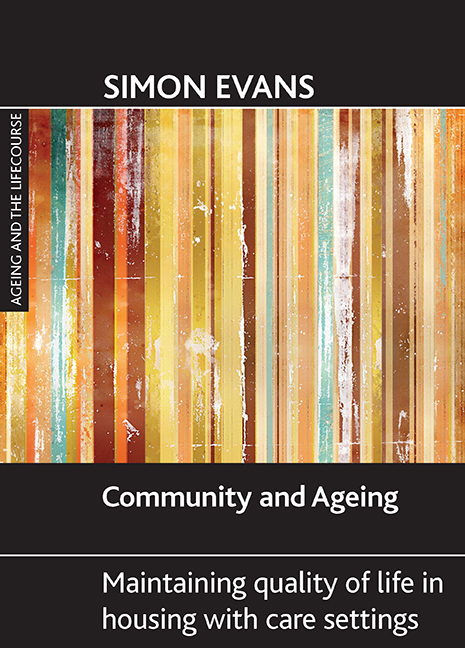Book contents
- Frontmatter
- Contents
- List of tables, boxes and photos
- Acknowledgements
- Foreword
- one Introduction
- two What is community?
- three Community and ageing
- four Housing with care communities in the UK
- five An international perspective on retirement villages
- six Promoting a sense of community in housing with care settings
- seven Diversity, community and social interaction
- eight Changing communities and older people
- nine Conclusion
- Appendix
- References
- Index
four - Housing with care communities in the UK
Published online by Cambridge University Press: 05 July 2022
- Frontmatter
- Contents
- List of tables, boxes and photos
- Acknowledgements
- Foreword
- one Introduction
- two What is community?
- three Community and ageing
- four Housing with care communities in the UK
- five An international perspective on retirement villages
- six Promoting a sense of community in housing with care settings
- seven Diversity, community and social interaction
- eight Changing communities and older people
- nine Conclusion
- Appendix
- References
- Index
Summary
Introduction
Providing sufficient housing for older people has become a policy priority in recent years, largely as a result of the rapid ageing of the population. The figures have been frequently quoted but they are worth summarising here because of their importance for the provision of both housing and care.
• The UK population aged over 65 grew by 31% from 7.4 million to 9.7 million between 1971 and 2006, while the number of people aged 85 and over grew by 69,000 from 2005 to 2006, reaching a record 1.2 million.
• The fastest-growing age group in the population is that of those aged 80 years and over, who currently constitute 4.5% (2,749,507) of the total population.
• By 2040, the number of people over 64 in Britain is expected to grow from 9.5 million to 15 million.
These trends will continue during the first half of this century as the large numbers of people born after the Second World War and during the 1960s baby boom grow older.
UK government policy has for many years supported older people to live in their own homes as a preferred option rather than moving into residential care. Residential care homes in particular have been seen as the last resort, largely because of their institutional image and a widespread belief that they are not conducive to independence. At the same time, traditional forms of sheltered housing are increasingly felt to be failing to meet the aspirations of the current generation of older people and have become ‘hard to let’ in some areas. This policy of ‘ageing in place’ has been challenged on various grounds, including the large number of older people living in poor-quality housing (Means, 2007) and the high prevalence of loneliness among older people who live alone in the community (Dalley, 2002). At the same time, much general housing is not suitable for older people who need care and there is a lack of appropriate services for older people who want to be cared for at home. In 2008 approximately 10% of people aged 65 or over were living in residential options such as nursing care homes, sheltered housing and extra care housing.
- Type
- Chapter
- Information
- Community and AgeingMaintaining Quality of Life in Housing with Care Settings, pp. 31 - 58Publisher: Bristol University PressPrint publication year: 2009



